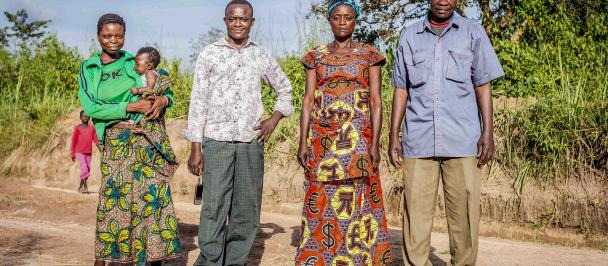Opening remarks by George Conway, Deputy Director of UNDP's Crisis Bureau on behalf of Asako Okai
Mental Health and Psychosocial Support in Peacebuilding
October 28, 2020
Colleagues and Partners,
I want to start with thanking the Government of Netherlands for the collaboration in bringing this event together and for championing this really important area of work on the integration of mental health and psycho-social support (MHPSS) in peacebuilding efforts. I also want to thank the IASC Secretariat for their engagement and support.
Globally, it is estimated that one in four persons will face a mental health concern in their lifetime. Mental health and psychosocial needs are simply an indispensable part of all of our lives. And yet these needs are further heightened when people live through crises, shocks and unprecedented change, as many communities are living through today.
All over the world, violence, disasters, breakdown of community and family structures, gender inequality, economic inequity, cultural polarization and racial prejudice are just some of the drivers that threaten the mental and psychological well-being of women, men, girls and boys. The ongoing COVID-19 pandemic, which has amplified pre-existing inequalities and other risks, has made it all the more pressing to address the issue of mental health in communities.
Therefore when we think of building long-lasting peace, and transforming the conditions that generate destructive conflict in communities, we cannot ignore the mental, psychological and emotional health of community members.
I would like to highlight three points for our discussion today, on how we can move forward together on this issue.
First, the 2020 Peacebuilding Architecture Review provides an excellent opportunity for the systematic incorporation of mental health and psychosocial support into our peacebuilding frameworks. The recognition of MHPSS as an integral part of peacebuilding in this year’s Secretary-General’s Report on Sustaining Peace provides us with a solid foundation from which to drive forward more joined up, system-wide and harmonized efforts in this area.
Second, to achieve the systematic integration of MHPSS into peacebuilding, we as a global community have some substantial learning to do. In collaboration with all relevant stakeholders, we need to collaborate to develop a global body of knowledge, tools, best practices and advocacy for this area, including by drawing upon a variety of fields such as behavioral science; clinical, social, and experimental psychology; traditional healing; and transitional justice, to name a few.
Third, I want to confirm UNDP is firmly committed to deepening our contributions in this area. At the global level, we have been pleased to participate in the development of the key recommendations put forward by the Government of the Netherlands and other members of the ‘Task Force on MHPSS in Peacebuilding.’ At the country level, our Country Offices are developing networks and capacities in order to better integrate MHPSS into national and community-based programming.
To give just a few examples, in Pakistan, the Philippines, Tanzania and Kazakhstan, UNDP is partnering with civil society organisations and experts to provide MHPSS, including through training professionals to provide mentorship and counselling to youth considered at risk of radicalisation.
Our work on prevention of violent extremism also exemplifies our focus on mental and psychological well-being by supporting individuals through mentorship schemes, counselling and skills development rather than attempting to combat extremism via purely securitised approaches.
Moving forward, we are also conducting a mapping of MHPSS initiatives in to promote the visibility of local initiatives, identify common challenges and existing strengths, and develop relevant tools and guidance.
I look forward to hearing from others today and want to express my thanks once again that this critically important dialogue has been organized.

 Locations
Locations




